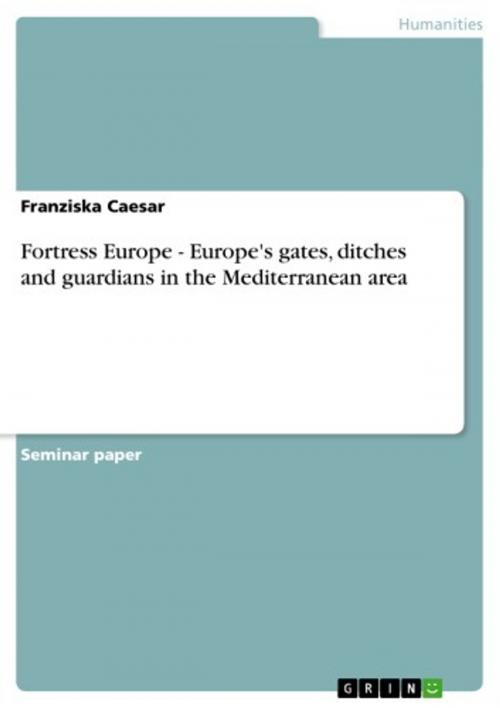Fortress Europe - Europe's gates, ditches and guardians in the Mediterranean area
Nonfiction, History, European General| Author: | Franziska Caesar | ISBN: | 9783656399346 |
| Publisher: | GRIN Verlag | Publication: | April 3, 2013 |
| Imprint: | GRIN Verlag | Language: | English |
| Author: | Franziska Caesar |
| ISBN: | 9783656399346 |
| Publisher: | GRIN Verlag |
| Publication: | April 3, 2013 |
| Imprint: | GRIN Verlag |
| Language: | English |
Seminar paper from the year 2013 in the subject Cultural Studies - European Studies, grade: 1,0, Jagiellonian University in Krakow (European Studies ), course: European Civilisation, language: English, abstract: Content Introduction .............................................................................................. 3 1. The huge wave of immigration into Europe .................................................... 4 2. 1 The Euro- Mediterranean region: an area of conflict ................................... 6 2. Fortress Europe - A 'Fortress of minds'? ..................................................... 9 2.1 The guardians: borders and camps .......................................................10 2.2 Humanitarian arguments ..........................................................................12 Conclusion: The immigrant 'Other' as threat or chance? ................................... 13 Bibliography ............................................................................................ 15 ? Introduction When we think of the Euro-Mediterranean region, we might imagine places of blithe holidays. However, they are also places of fright, capsized boat people from North Africa, drowning or dying of thirst in rickety and overloaded vessels. In the hope of finding a better future in Europe, they desperately expose their lives to the forces of the sea. Nevertheless, the public sphere is rather casually informed about these tragedies and even tends to apathy and insensitivity due to ostensibly constant and similar reporting about boat tragedies. Especially in these days of radical changes in the Arabic world including halting establishment of better living conditions and daily cruelties in Syria, many people demand that their outcry for freedom should gain attention in nearby Europe. Acting from necessity, people from North Africa, the Middle East and Asia set off towards Europe in hopes of a better life. Once knocking on Europe's gates at the coast lines of Spain, Italy or Greece, they suddenly have to realize that what they encounter, is in fact not the expected paradise, Just recently, an Amnesty International Report published in December 2012 strongly condemned the 'shameful and terrible' situation of refugees in Greece. It marks yet another alert signal to speak about a European humanitarian crisis; not outside the borders, but within. According to the report, refugees in Greece, originating from Africa, Pakistan, Iran or Syria are not even being provided with the minimum standard of protection and security. Against the background of the financial crisis the situation is getting more dramatic in Greece. Racist street violence, fascist resurgence and radical actions by Greek patrol boats in the border river Evros between Turkey and Greece testify human right violations. Such tendencies not count for Greece solely, they are characteristic for European encounters with enormous immigration waves in general. ...
Seminar paper from the year 2013 in the subject Cultural Studies - European Studies, grade: 1,0, Jagiellonian University in Krakow (European Studies ), course: European Civilisation, language: English, abstract: Content Introduction .............................................................................................. 3 1. The huge wave of immigration into Europe .................................................... 4 2. 1 The Euro- Mediterranean region: an area of conflict ................................... 6 2. Fortress Europe - A 'Fortress of minds'? ..................................................... 9 2.1 The guardians: borders and camps .......................................................10 2.2 Humanitarian arguments ..........................................................................12 Conclusion: The immigrant 'Other' as threat or chance? ................................... 13 Bibliography ............................................................................................ 15 ? Introduction When we think of the Euro-Mediterranean region, we might imagine places of blithe holidays. However, they are also places of fright, capsized boat people from North Africa, drowning or dying of thirst in rickety and overloaded vessels. In the hope of finding a better future in Europe, they desperately expose their lives to the forces of the sea. Nevertheless, the public sphere is rather casually informed about these tragedies and even tends to apathy and insensitivity due to ostensibly constant and similar reporting about boat tragedies. Especially in these days of radical changes in the Arabic world including halting establishment of better living conditions and daily cruelties in Syria, many people demand that their outcry for freedom should gain attention in nearby Europe. Acting from necessity, people from North Africa, the Middle East and Asia set off towards Europe in hopes of a better life. Once knocking on Europe's gates at the coast lines of Spain, Italy or Greece, they suddenly have to realize that what they encounter, is in fact not the expected paradise, Just recently, an Amnesty International Report published in December 2012 strongly condemned the 'shameful and terrible' situation of refugees in Greece. It marks yet another alert signal to speak about a European humanitarian crisis; not outside the borders, but within. According to the report, refugees in Greece, originating from Africa, Pakistan, Iran or Syria are not even being provided with the minimum standard of protection and security. Against the background of the financial crisis the situation is getting more dramatic in Greece. Racist street violence, fascist resurgence and radical actions by Greek patrol boats in the border river Evros between Turkey and Greece testify human right violations. Such tendencies not count for Greece solely, they are characteristic for European encounters with enormous immigration waves in general. ...















